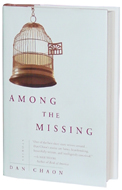|
For sixteen years, esteemed editor Shannon Ravenel has delivered the finest short stories to be found in this annual Algonquin collection, New Stories from the South. (Algonquin's stable is famous for nurturing talent like Larry Brown into becoming literary powerhouses.) Author Lee Smith, wife of the esteemed Mencken of our day, Hal Crowther, provides the lively introduction. Despite the fact that many southern writers have done some of their absolute best work in the short story form (Flannery O'Connor and the recently-deceased Eudora Welty, for example), it is a genre that is rapidly fading from the literary landscape. Collections don't generate much money for publishers, and financially, authors can make a far better living as novelists than they can as short story writers. Books like this remind us how important it is to support the form, as well as the writers. This year's entry includes both legends and near-novices. Madison Smartt Bell is one of the best known contributors, and never fails to delight. If nothing else, it serves as an introduction to writers you might not otherwise meet - in a forum that doesn't require a substantial time commitment. -Rhonda Reeves
 Among the Missing Among the MissingDan Chaon Ballantine Books, New York Having an ear for storytelling is like having perfect pitch, only rarer. Fiction writers who have it - that subtle knack for knowing not only what truth is, but what it sounds like - are hard to come by. One such writer is Dan Chaon, and the twelve stories in his new collection Among the Missing are miracles all, lovely and strange as truth. In these tales, the American family emerges not as it has been conjured in the dream of a nation, but as it really exists at the cusp of a new century: fractured, multifarious, caught spellbound in a struggle to reclaim its former dignity. In "Safety Man," a young widow manages to live with the hugeness of loss but cannot rest after discovering a human tooth in a workplace ashtray. In " I Demand To Know Where You're Taking Me," a woman confronts her own dreadful suspicions about a convicted brother-in-law only after she hears them voiced by a macaw. Here is the grand fear that comes with loving someone, anyone: fear of being left alone, whether by time or distance or death. In prose as frank and itchy as conscience itself, Chaon reminds us that loss, like fear, has weight; that it is as much a part of our humanness as our desire to live happily and well. At every turn, Among the Missing offers the same startling mysteries that form the sum of our loves and our lives. This work does what all good fiction should: it provides us with unexpected glimpses of ourselves. - Sarah Van Arsdale
Phone Calls from the Dead is a wonderfully subtle and accomplished group of short stories. Brenner's story "Nipple," less then four pages in length, is a shining example of what a short story should accomplish. Upon a superficial reading it seems to be a story about brain dead teenagers having a soulless conversation about meaningless lies. But, this story is reminiscent of a candle being held to an antique mirror. If you watch the flame in the glass for a moment you will see multiple reflections appear behind the first. Although on one level this is a story about a girl (Meghan) who feels alienated in a sea of meaningless chatter around her, on a deeper level this story shows a girl who has had an affair with the minister of her church and was forced to seek an abortion, aware of her body and a new truth that her high school peers do not understand. Brenner's characters look for understanding and meaning in a modernized, mechanized and often disturbing world. In the story "Four Squirrels," the reader is shown both the need for connecting with someone as well as the need for disconnection and solitude. The squirrels were bound together at birth by a trash bag, each an individual in personality and desires, all bonded by a bag on their tails. At one point in the story they wake up with a rabid raccoon perched above them on a limb, drooling onto their coats and chanting the words, "The end, the end, the end." This scene conjures in the mind both our need for society as well as a need for escape, all overshadowed by the looming specter of fear-death-disaster. Phone Calls from the Dead is an intelligent and entertaining journey into both the short story form as well as a commentary on the fundamental human condition and struggle for understanding in a modernity that may have no meaning other then that which we ascribe to it. -Joshu Goebeler
The independent music scene of the 1980s certainly was an exciting ghostly network of little-bands-that-could. Framed from around the time that the Sex Pistols flamed out until Nirvana's big splash with the Nevermind album, Azerrad presents an interwoven series of profiles about bands like Mission of Burma, Husker Du and The Replacements. He doesn't focus much on the music, surprisingly: more important details seem to be how the musicians stayed alive on the road, where the money and know-how for pressing and distributing self-promoted records came from, and what body parts got the worst of fights with punkers, bouncers, and police. This makes for a peculiar view of an American art scene, and there are certainly times when the verbiage doesn't seem justified. The Minor Threat vocalist can't handle melodies, so the band breaks up. SST record-label founder Greg Ginn is written up as "enigmatic," but the actions seem to merit no more than a quick write-off as simple petulance and passive-aggression. It's great that Azerrad takes the time to show the development of today's "alternative rock" sound and the Seattle grunge scene as the work of people who seemed to be fighting against the odds despite the discouraging trend for record corporations to consolidate power and plug boring and predictable product. And west-coast bands Black Flag really did make a difference with how they wrenched punk rage away from the leather-jacket posers and gave it to the alienated American suburban kids. But how many details of life in the van are necessary? Henry Rollins goes from crazy nobility to self-aggrandizing pusher of retread scowl-rock before our eyes. Azerrad lays on the case for the admirability of all these acts a little thick - though the devoted underground music fans deserve to hear more than just pulp-zine hearsay about the Minutemen and others recounted here. -T.E. Lyons
Write what you know, they say, and Steve Earle has done that with Doghouse Roses. Troubadour turned scribe, Earle has crafted a moving collection of short stories, an emotional tour across America that walks a strange path from Nashville grit to Death Row valor and L. A. glitz. Exploring the lives of eighteen wheelers and street dealers alike, these tales are much like their creator, tough and provocative. Many critics have noted that this collection consists of previously unpublished work. -Chris Webb
|
||
|
|
 New Stories from the South, 2001/edited
New Stories from the South, 2001/edited Doghouse Roses
Doghouse Roses